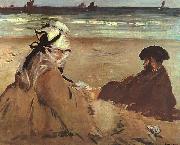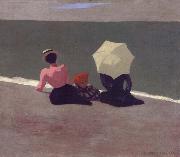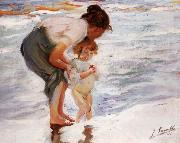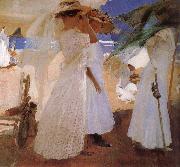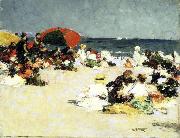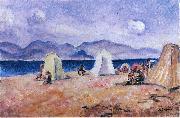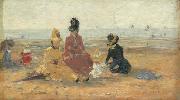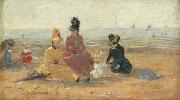Wholesale Oil Painting No Minimum |
|||||||||||
|
|
|||||||||||

|
|||||||||||
|
|
|
||||||||
Edouard ManetFrench Realist/Impressionist Painter, 1832-1883 The roughly painted style and photographic lighting in these works was seen as specifically modern, and as a challenge to the Renaissance works Manet copied or used as source material. His work is considered 'early modern', partially because of the black outlining of figures, which draws attention to the surface of the picture plane and the material quality of paint. He became friends with the Impressionists Edgar Degas, Claude Monet, Pierre-Auguste Renoir, Alfred Sisley, Paul Cezanne, and Camille Pissarro, through another painter, Berthe Morisot, who was a member of the group and drew him into their activities. The grand niece of the painter Jean-Honor?? Fragonard, Morisot's paintings first had been accepted in the Salon de Paris in 1864 and she continued to show in the salon for ten years. Manet became the friend and colleague of Berthe Morisot in 1868. She is credited with convincing Manet to attempt plein air painting, which she had been practicing since she had been introduced to it by another friend of hers, Camille Corot. They had a reciprocating relationship and Manet incorporated some of her techniques into his paintings. In 1874, she became his sister-in-law when she married his brother, Eugene. Self-portrait with palette, 1879Unlike the core Impressionist group, Manet maintained that modern artists should seek to exhibit at the Paris Salon rather than abandon it in favor of independent exhibitions. Nevertheless, when Manet was excluded from the International exhibition of 1867, he set up his own exhibition. His mother worried that he would waste all his inheritance on this project, which was enormously expensive. While the exhibition earned poor reviews from the major critics, it also provided his first contacts with several future Impressionist painters, including Degas. Although his own work influenced and anticipated the Impressionist style, he resisted involvement in Impressionist exhibitions, partly because he did not wish to be seen as the representative of a group identity, and partly because he preferred to exhibit at the Salon. Eva Gonzal??s was his only formal student. He was influenced by the Impressionists, especially Monet and Morisot. Their influence is seen in Manet's use of lighter colors, but he retained his distinctive use of black, uncharacteristic of Impressionist painting. He painted many outdoor (plein air) pieces, but always returned to what he considered the serious work of the studio. Manet enjoyed a close friendship with composer Emmanuel Chabrier, painting two portraits of him; the musician owned 14 of Manet's paintings and dedicated his Impromptu to Manet's wife. Throughout his life, although resisted by art critics, Manet could number as his champions Emile Zola, who supported him publicly in the press, Stephane Mallarme, and Charles Baudelaire, who challenged him to depict life as it was. Manet, in turn, drew or painted each of them. |
||||||||
|
|
||||||||
On the Beach
On the Beach Painting ID:: 2709 |
|
|||||||
|
|
||||||||
Felix Vallotton1865-1925was a Swiss painter and printmaker associated with Les Nabis. He was an important figure in the development of the modern woodcut. He was born into a conservative middle class family in Lausanne, and there he attended College Cantonal, graduating with a degree in classical studies in 1882. In that year he moved to Paris to study art under Jules Joseph Lefebvre and Gustave Boulanger at the Academie Julian. He spent many hours in the Louvre, where he greatly admired the works of Holbein, Derer and Ingres; these artists would remain exemplars for Vallotton throughout his life.[1] His earliest paintings, such as the Ingresque Portrait of Monsieur Ursenbach (1885), are firmly rooted in the academic tradition, and his self portrait of 1885 (seen at right) received an honorable mention at the Salon des artistes français in 1886. During the following decade Vallotton painted, wrote art criticism and made a number of prints. In 1891 he executed his first woodcut, a portrait of Paul Verlaine. The many woodcuts he produced during the 1890s were widely disseminated in periodicals and books in Europe as well as in the United States, and were recognized as radically innovative in printmaking. They established Vallotton as a leader in the revival of true woodcut as an artistic medium; in the western world, the relief print, in the form of commercial wood engraving, had long been mainly utilized unimaginatively as a medium for the reproduction of drawn or painted images and, latterly, photographs. Vallotton's starkly reductive woodcut style features large masses of undifferentiated black and areas of unmodulated white. While emphasizing outline and flat patterns, Vallotton generally made no use of the gradations and modeling traditionally produced by hatching. The influences of post-Impressionism, symbolism and the Japanese woodcut are apparent; a large exhibition of ukiyo-e prints had been presented at the École des Beaux-Arts in 1890, and Vallotton, like many artists of his era an enthusiast of Japonism, collected these prints. He depicted street crowds and demonstrations including several scenes of police attacking anarchists bathing women, portrait heads, and other subjects which he treated with a sardonic humor. His graphic art reached its highest development in Intimit's (Intimacies), a series of ten interiors published in 1898 by the Revue Blanche, which deal with tension between men and women. Vallotton's prints have been suggested as a significant influence on the graphic art of Edvard Munch, Aubrey Beardsley, and Ernst Ludwig Kirchner .By 1892 he was affiliated with Les Nabis, a group of young artists that included Pierre Bonnard, Ker-Xavier Roussel, Maurice Denis, and Edouard Vuillard, with whom Vallotton was to form a lifelong friendship. During the 1890s, when Vallotton was closely allied with the avant-garde, his paintings reflected the style of his woodcuts, with flat areas of color, hard edges, and simplification of detail. |
||||||||
|
|
||||||||
|
|
on the beach
on the beach Painting ID:: 45773 |
mk185
1899
Oil on cardboard
42x48cm
mk185 1899 Oil on cardboard 42x48cm |
||||||
|
|
||||||||
Joaquin Sorolla Y BastidaSpanish Realist/Impressionist Painter , 1863-1923 Spanish painter, b. Valencia. He is noted for his large landscapes in full, glowing sunlight, painted in strong color and in a bold, fluent style. Sorolla's best-known works include Beaching the Boat and The Swimmers. |
||||||||
|
|
||||||||
|
|
On the Beach
On the Beach Painting ID:: 51857 |
mk221
1908
Oil on canvas
47x58.1cm
mk221 1908 Oil on canvas 47x58.1cm |
||||||
|
|
||||||||
Joaquin SorollaSpanish Realist/Impressionist Painter, 1863-1923 |
||||||||
|
|
||||||||
|
|
On the beach
On the beach Painting ID:: 61715 |
mk275 1910 Oil on canvas 100 x 115 cm Art Museum St. Louis, Missouri mk275 1910 Oil on canvas 100 x 115 cm Art Museum St. Louis, Missouri |
||||||
|
|
||||||||
Edward Henry Potthast PrintsAmerican Impressionist Painter, 1857-1927 Edward Henry Potthast (1857 ?C 1927) was an American Impressionist painter. He was born in Cincinnati, Ohio. From June 10, 1879 to March 9, 1881 he studied with Thomas Satterwhite Noble. He later studied at the Royal Academy in Munich with the American-born instructor Carl Marr. After returning to Cincinnati in 1885 he resumed his studies with Noble. In 1886 he departed for Paris, where he studied with Fernand Cormon. In 1895 he relocated to New York City and remained there until his death in 1927. |
||||||||
|
|
||||||||
|
|
On the Beach
On the Beach Painting ID:: 71358 |
ca. 1913(1913)
Oil on canvas
31.6 x 40.7 cm (12.44 x 16.02 in)
ca. 1913(1913) Oil on canvas 31.6 x 40.7 cm (12.44 x 16.02 in) |
||||||
|
|
||||||||
Henri Lebasque PrintsFrench Painter, 1865-1937 was born in 1865 at Champign?? (Maine-et-Loire). He started his education at the Ecole des Beaux-Arts d??Angers, and moved to Paris in 1886. Here, Lebasque started studying under L??on Bonnat, and assisted Humbert with the decorative murals at the Panth??on. Around this time, Lebasque met Camille Pissarro and Auguste Renoir, who later would have a large impact on his work. Lebasque's vision was coloured by his contact with younger painters, especially Edouard Vuillard and Pierre Bonnard, founders of the The Nabis' Group and the Intimists who first favoured the calm and quietude of domestic subject matter. From his first acquaintance with Georges Seurat and Paul Signac, Lebasque learnt the significance of a colour theory which stressed the use of complementary colours in shading. Lebasque was a founding member of the Salon d'Automne in 1903 with his friend Henri Matisse. Two years later a group of artists exhibited there including Georges Rouault, Andr?? Derain, Edouard Vuillard and Henri Matisse while keeping solid links with other artists such as Gustave Rouault, Raoul Dufy, Louis Valtat and especially Henri Manguin, who made him discover the south of France. His time in South of France would lead to a radical transformation in Lebasque??s paintings, changing his colour palette forever. Other travels included the Vend??e, Normandie and Brittany, although Lebasque would always prefer the small idyllic villages of the South of France. Lebasque had some commercial success during his lifetime. He worked on the decorations at the theatre of the Champs-Elys??es and of the Transatlantique sealiner. Lebasque died at Cannet, Alpes Maritimes in 1937. His work is represented in French museums, notably Angers, Geneva (Petit Palais), Lille (Mus??e des Beaux-Arts), Nantes and Paris (Mus??e d??Orsay) as well as many more around the world. Famed as a painter of 'joy and light', Lebasque is admired for the intimacy of his subject matter and his unique delight in colour and form. |
||||||||
|
|
||||||||
|
|
On the Beach
On the Beach Painting ID:: 73106 |
On the Beach," oil on canvas, by the French artist Henri Lebasque. Image courtesy of The Athenaeum.
cjr On the Beach," oil on canvas, by the French artist Henri Lebasque. Image courtesy of The Athenaeum. cjr |
||||||
|
|
||||||||
Eugene Boudin1824-1898 French landscape painter. Encouraged at an early age by Jean-Francois Millet, Boudin became a strong advocate of painting directly from nature. In 1874 he exhibited with the Impressionists, but, unlike those painters, he was not an innovator, and from 1863 to 1897 he exhibited regularly in the official Salon. His favourite subjects were beach scenes and seascapes, which show remarkable sensitivity to effects of atmosphere; on the backs of his paintings he recorded the weather, light, and time of day. His works link the careful naturalism of the mid 19th century and the brilliant colours and fluid brushwork of Impressionism. |
||||||||
|
|
||||||||
|
|
On the Beach
On the Beach Painting ID:: 77527 |
oil on panel painting by Eug??ne Boudin, 1887
cyf oil on panel painting by Eug??ne Boudin, 1887 cyf |
||||||
|
|
||||||||
Eugene Boudin1824-1898 French landscape painter. Encouraged at an early age by Jean-Francois Millet, Boudin became a strong advocate of painting directly from nature. In 1874 he exhibited with the Impressionists, but, unlike those painters, he was not an innovator, and from 1863 to 1897 he exhibited regularly in the official Salon. His favourite subjects were beach scenes and seascapes, which show remarkable sensitivity to effects of atmosphere; on the backs of his paintings he recorded the weather, light, and time of day. His works link the careful naturalism of the mid 19th century and the brilliant colours and fluid brushwork of Impressionism. |
||||||||
|
|
||||||||
|
|
On the Beach
On the Beach Painting ID:: 82959 |
1887(1887)
Medium Oil on panel
cyf 1887(1887) Medium Oil on panel cyf |
||||||
|
|
||||||||
Eugene Boudin1824-1898 French landscape painter. Encouraged at an early age by Jean-Francois Millet, Boudin became a strong advocate of painting directly from nature. In 1874 he exhibited with the Impressionists, but, unlike those painters, he was not an innovator, and from 1863 to 1897 he exhibited regularly in the official Salon. His favourite subjects were beach scenes and seascapes, which show remarkable sensitivity to effects of atmosphere; on the backs of his paintings he recorded the weather, light, and time of day. His works link the careful naturalism of the mid 19th century and the brilliant colours and fluid brushwork of Impressionism. |
||||||||
|
|
||||||||
|
|
On the Beach
On the Beach Painting ID:: 83163 |
1887(1887)
Medium Oil on panel
cyf 1887(1887) Medium Oil on panel cyf |
||||||
|
|
||||||||
|
Eugene Boudin 1824-1898 French landscape painter. Encouraged at an early age by Jean-Francois Millet, Boudin became a strong advocate of painting directly from nature. In 1874 he exhibited with the Impressionists, but, unlike those painters, he was not an innovator, and from 1863 to 1897 he exhibited regularly in the official Salon. His favourite subjects were beach scenes and seascapes, which show remarkable sensitivity to effects of atmosphere; on the backs of his paintings he recorded the weather, light, and time of day. His works link the careful naturalism of the mid 19th century and the brilliant colours and fluid brushwork of Impressionism. On the Beach 1887(1887) Medium Oil on panel cyf |
||||||||
|
|
||||||||
|
Prev Next
|
||||||||
|
|
||||||||
|
Related Paintings to Eugene Boudin :. |
||||||||
|
|
||||||||
|
CONTACT US |
